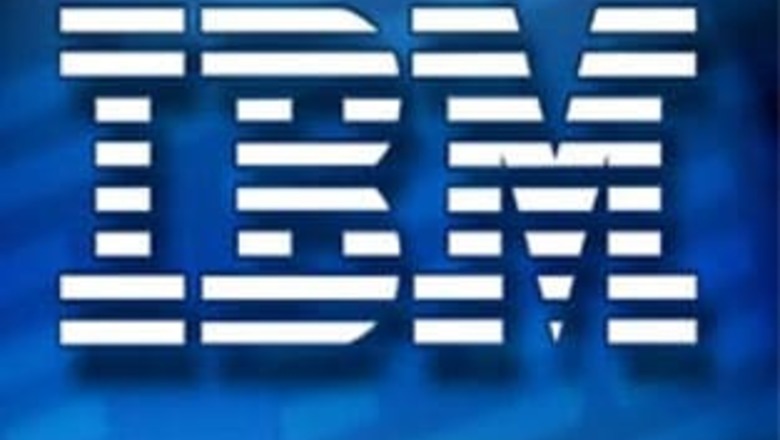
views
It's a mother of all deals in the making. The Wall Street Journal reports that IBM is in talks to buy Sun Microsystems for at least $ 6.5 billion.
What are the implications of this deal on the global technology sector? Editor-in-Chief of zdnet.com, Lawrence Dignan, and Managing Director of TPI, Siddharth Pai, said IBM is looking to increase its presence all three spaces: hardware, software and services.
"Everybody is racing to offer hardware-software services and own the data centre. We saw some of that earlier in week with Cisco, HP bought EDS, now IBM is looking at Sun and Sun could give it some extra hardware market share specifically in servers," Dignan said. "On paper, this deal looks like it would get regulatory approval. A big unknown though is the new administration in the US and they haven't had to approve a merger yet," he added.
"This is more a retaliatory move to the HP-EDS acquisition than it is a watershed deal," Pai said. "Specifically in India, there is not very much overlap because most of what IBM has been doing in India is increasing its muscle in the services space and not so much in the hardware or the software space."
Here is a verbatim transcript of Lawrence Dignan and Siddharth Pai's exclusive interview on CNBC-TV18. Also watch the accompanying video.
Q: What to your mind are the strategic synergies of this deal going through and how much of this is really about Cisco and how much of it is really about HP now that HP has acquired EDS?
Dignan: In the space in general, there is a lot of consolidation. Everybody is racing to offer hardware-software services and own the data centre. We saw some of that earlier in week with Cisco, HP bought EDS, now IBM is looking at Sun and Sun could give it some extra hardware market share specifically in servers. There is some question about overlaps there.
The other part of the equation is software. IBM by acquiring Sun would get access to Java, which is on everything and everywhere and it would also get some open source software such as MySQL, which is a database, OpenSolaris, which is a pretty well-known Linux operating system. So there are some synergies but I do think it is time for Sun to hit the exit ramp because they do have some tough times ahead.
Q: What do you make of this possible transaction and what kind of impact will it have if the deal goes through on its Indian operations?
Pai: I would agree with everything that Larry just said. It does provide IBM with a wide platform: ardware, software as well as services. Over the last few years, IBM has been getting known more and more as a software and services company, and less and less as a hardware company, which was originally its heritage.
This move actually changes it and will increase the revenue that they get from hardware including Sun to about a third of their total revenue as well as give them about a 42-43 per cent market share in the server space. So, in fact it would be quite a big move for them and gives them the platform to actually compete with HP-EDS, which has now created a conglomerate. It has everything from server perspective to a software perspective to a services standpoint as well. So, it is overall a good deal for IBM.
Specifically in India, there is not very much overlap because most of what IBM has been doing in India is increasing its muscle in the services space and not so much in the hardware or the software space. They do sell locally in the market but the idea more than anything else is for them to be able to use the hardware platform worldwide and use potentially some of the Indian services operations as a value-add over those hardware and software sales they have been making worldwide.
Q: We have seen the Sun stock rallying up by over 66 per cent on the back of the possibility of this transaction going through. But there have been question marks on regulatory issues or obstacles. What are you picking up from that?
Dignan: On paper, this deal looks like it would get regulatory approval. We are not talking 80 per cent market share in servers or anything. I think the big unknown though is a new administration in the US and they haven't had to approve a merger yet. So, I think that is a big uncertainty. What is the MO for the US regulatory approach?
Just to backtrack on the India point, Sun has a lot of telecom and financial services customers and these are the type of verticals that are increasingly moving things offshore. So there could be some synergy there in terms of — IBM is a big player in India. Sun's customers are basically US-based. So there could be some synergies there as well.
Q: What do you make of this timing in terms of the significance of it and secondly IBM and Sun are very different companies culturally, so would that be difficult to sync in as well?
Dignan: As far as the timing, it has been mentioned that it is as early as this week. We have been hearing from the grapevine that the deal – the Wall Street Journal is on target that this deal is about to happen.
The cultural differences between the two companies is worth noting but I do think the cultural thing might be slightly overblown because Sun has good engineers, they have good technical talent and my hunch is IBM would just have a bigger presence in Silicon Valley because IBM is everywhere but their primary headquarters is in the East Coast. So there might be some cultural hiccups but in this market if you are a Sun employee, it is not a bad thing to have somebody like an IBM as a big brother.
Q: We have seen the US market rebounding just a tad. There is talk of a possible up-tick as far as the economy is concerned. We have seen a lot of deals taking place in the pharmaceutical space, do you think that this could perhaps spark off or trigger of some sort of consolidation within the global tech space as well now?
Pai: One certainly hopes so. The up-tick that we have seen in the last week or so has given us some cause for cheer but to be honest, this is more a retaliatory move to the HP-EDS acquisition than it is a watershed deal or some significant up-tick or a signal of a significant up-tick in worldwide markets.
I wish I could say the opposite but this is a reaction, it is not the fountain of new economic freedom, so to speak.




















Comments
0 comment